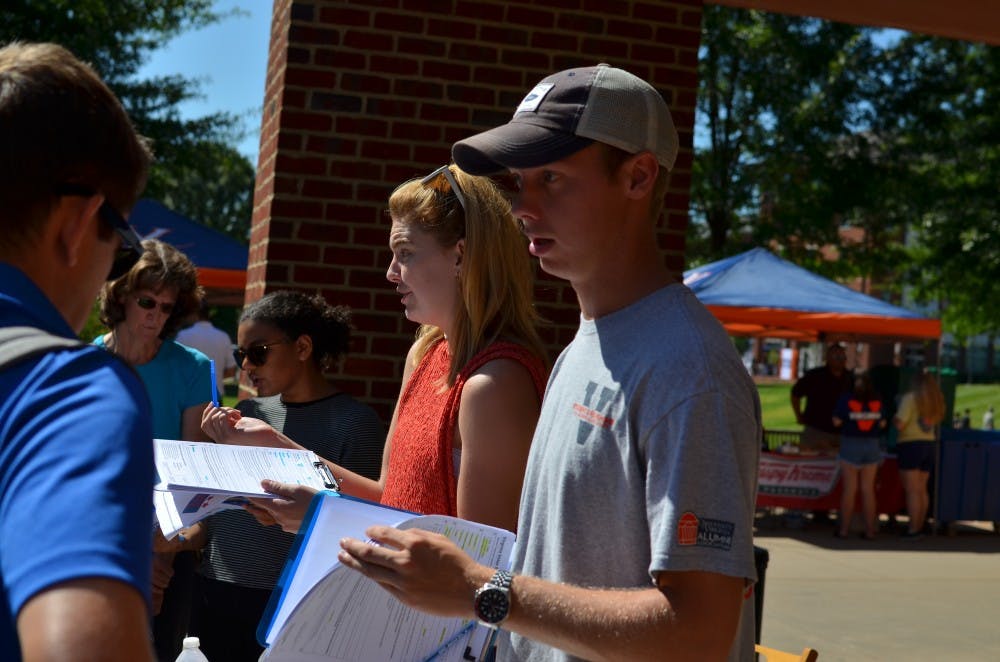In a show of bipartisan civic engagement, Student Council’s Legislative Affairs Committee brought together University Democrats, College Republicans and over one dozen other local and state organizations this past weekend to register incoming first-years to vote at their new addresses.
With their collective efforts outside first-year dorms, the organizations worked with Indivisible Charlottesville, Charlottesville Democrats, the League of Women Voters and others groups to register approximately 425 students as they moved into the University. The registrations come ahead of the Oct. 15 deadline to register to vote prior to the midterm elections in November.
“Every time we get a U.Va. student to register or update their registration, it's always really exciting,” Alex Hendel, a third-year Batten student and Student Council Legislative Affairs Committee vice-chair for civic engagement, wrote to The Cavalier Daily after the event.
The true number of new registrants is likely greater than the number of forms submitted, Hendel added. The voter registration forms collected by volunteers ask for Social Security number — a personal detail some may have felt uncomfortable divulging, according to Hendel — so volunteers carried flyers with the online voter registration URL.
University Democrats Campaign Chair Jackson Samples, a third-year College student leading the effort for the organization, said the groups were working together to help students be politically active, regardless of their partisan leanings.
“Our main goal is literally just to register as many students as possible, because we believe that a civically engaged campus is the best one," Samples said. "Doing it on move-in weekend is a very efficient way to do it.”
Robert Andrews, a fourth-year College student and College Republicans chairman, agreed on the importance of Student Council’s bipartisan push for civic engagement.
"It shows how, despite all of our differences, we're committed to a common goal of getting people involved in the political process,” Andrews said. “And, I think with all of the division these days, it's good that we can still rally around the common point in getting fellow students to be active, rather than be apathetic."
As required by federal law, the University itself assists in registering students to vote by distributing registration information by email. Andrews says the practice isn’t enough, citing other institutions with offices dedicated to helping students register to vote.
“Other universities, particularly in Virginia, have departments dedicated to civic engagement among students, so I feel that — as a leader of institutions that U.Va. is — it would be important for them to take more of a role,” Andrews said. “And that's not a knock on the University by any means, they're very busy and they have a lot of responsibilities to meet. So I feel that it's up to us as students to make them aware of these structural issues when it comes to civic engagement."
Beyond addressing voter registration difficulties, Student Council is working with University Democrats and College Republicans to eliminate another barrier to students who want to vote — exams. The three organizations circulated a petition to faculty members in early August, asking they not hold midterm examinations during the midterm elections on Nov. 6. At press time, the petition had 58 faculty signatures.
“Every year, hundreds of UVA students in several large, core lectures take tests on Election Day that seriously impede their ability to participate in the political process,” the petition reads. “Young people have consistently had lower voter turnout rates than other age groups, and exams on Election Day compound existing difficulties and drive these rates further down.”
Petition signatory and Assoc. History Prof. Andrew Kahrl told The Cavalier Daily he does not hold exams — or even classes — on Election Day.
"I think it would be really hypocritical of me, as a professor, to spend the balance of my semester trying to impart knowledge and critical thinking skills that a student would need to become an informed and engaged citizen, and then at the same time put in place barriers that would make it harder to exercise one of the most critical functions of being a member of society, which is voting,” Kahrl said.
Kahrl added that administration should bar classes University-wide on Election Day.
"They should set an example for our students and for the nation by not having class on Election Day,” Kahrl said. “I think that the only way we're ever going to get to a point where Election Day becomes a national holiday is when universities and employers and other institutions make a point of allowing and encouraging their employees and their students to vote by not putting barriers in the way."







